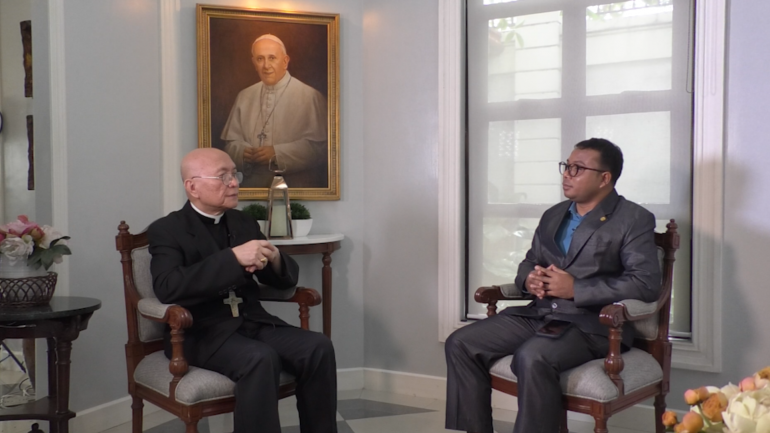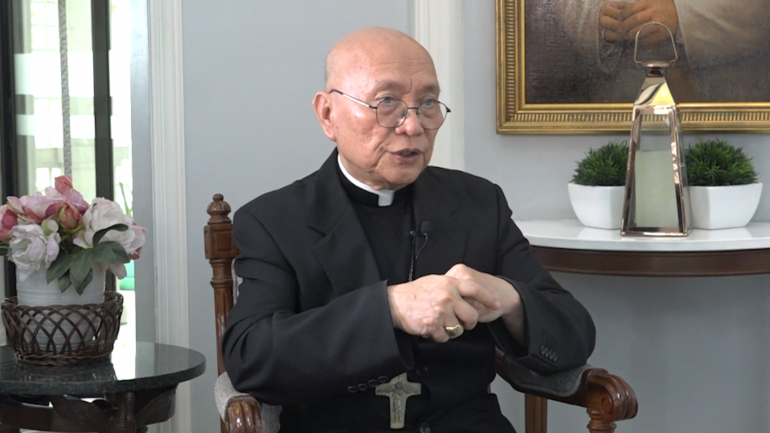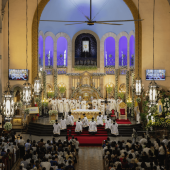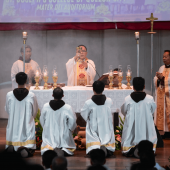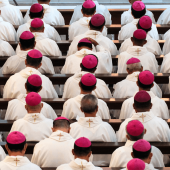Digital technology is a gift, says Filipino bishop
Digital technology is a gift because it connects people to the rest of the world, and it should not be abused, said Honesto Flores Ongtioco, Bishop of Cubao, Philippines, in Part II of his interview with Father Kasmir Nema of Radio Veritas Asia (RVA).
This is one of the lessons learned during the pandemic, when the world had to observe physical distancing because of the coronavirus disease (COVID-19), an infectious disease caused by the SARS-CoV-2 virus.
"We thank God we have this technology that has really helped us in many ways to continue with our evangelization program... to restore the beauty of creation.. to recreate the heart of man.. mirroring who is the source of everything,”, said Bishop Ongtioco.
The pandemic, which we don't want to happen (again), made us realize that we need each other and that countries cannot stand on their own.
“We have ecumenical dialogue,” said the bishop, as he referred to the triple dialogue in the Federation of Asian Bishops’ Conferences: with culture, the poor, and with religion.
He underscored the need for formality, like in prayer, where he discourages multi-tasking.
Bishop Ongtioco also answered questions on being charged by the police for seduction with three other bishops, which he said was dismissed after some years, with the help of people and God.
In the controversial case of the drag queen Pura Luka Vega, who was declared non-grata in many provinces in the country, he said, “What's important is that we pray for people's conversion. We pray for them because God wants everyone to be part of his flock. So even those who are way out, I think God will always find a way to win them back,” said Ongtioco.
As a bishop and father of the diocese, he said love in the ministry does not forget his brother priests, whom he also considers to be his children, and who God, including their weaknesses, entrusted to him.
As he reaches the age of 75, he will write the Holy Father in Rome his resignation from administrative responsibility and will have to wait for his response.
“I'm telling the Lord that if you still want me to serve, it is okay. If you want me to serve you another way, that is also okay. I'm very grateful to the Lord because of his love and mercy,” said Bishop Ongtioco.
The interview ended with him inviting people to subscribe to the RVA channel “to know what is truthful... according to the standards that Jesus gave”.
Read the full transcript of the interview below.
VOICE OF ASIAN BISHOPS
Fr. Kasmir Nema: Speaking about that love, you know, burning in your heart and throughout your ministry, have you also experienced when you tried to expound that love in your ministry, but you also faced so many challenges? Can you see and also say to us the challenges or difficulties that you face, the major ones in your ministry?
Bishop Honesto:
Well, as a bishop, your first concern is your frontliners, your priests, your brother, and your priests. I say your brother. Priest Lord, they call you Father, the father of the diocese. They are your children. So being the father, whatever happens, I remember my father. I made a mistake getting somebody to fix the piano. I didn't have any money. I charge it to my father, who is a hard worker in the market. By God, I didn't know that. The man charged a big amount.
You know what my father said? You know this. Even if you are a priest, I am your father. And whatever you do, I will stand for you now. Keep my heart. I will stand for you. I will die for you. And that's how I look at my brother priests. I am their father. Even if they do something that's so good, I will not condone it. But I will still help them rise above their mistake. So it's a big mistake. You cannot just set them aside because God entrusted them to you so that you could help them in their weakness. So it's difficult at the same time. Very rewarding. Of course, we don't forget the dedication, showing the commitment of the other priests who are more than those who are. Of course, sometimes people just focus on the efforts of those, you know, who are not that good rather than see the beauty of things.
Fr. Kasmir Nema: Thank you for that great missionary set-up. Let's move into FABC now. Are you aware of the tribble dialogues in FABC? Dialogue with culture, with the poor, and with religion. How have these tribble dialogues been implemented in your diocese?
Bishop Honesto:
So here, I think it's more about the attitude that we should develop when we are not exposed to us. Sometimes with some realities, like, I'm sure these would be different if I were in India or Cambodia, where the minority, you know, the Catholicism, is just a minority. So we are talking about understanding culture, language, and religion. Yes, I have that at the back of my mind. But the situation is such that you have many Catholics here; although I have, I do not forget other countries. But it's different when you are immersed in and exposed to such realities. But the idea of understanding is there. We have ecumenical dialogue. That's just a taste of what it means to understand culture and other religions.
So talking about this and how we can contribute—just attending to our own people—is already a big, big challenge, especially nowadays during COVID and after we still have not ended the pandemic. It's still on. But again, this is a challenge. So it brought many blessings. We don't want the pandemic to happen, but it made us realize that we need each other. It made countries realize they could not just stand on their own. They need others. So even here, people realize that they need each other. So some, instead of just being content with their way of life in their security, broke down the walls to reach out to people. So we have that community pantry where those who have no food can always go because they know there will be some people who will reach out to them. And that's what we did. You know, weekly. We had community pantries, and even before that, being in the city, it's different. There are a lot of street people, but we can tell you are happy to see many converts like Bishop.
Instead of celebrating my birthday, I'm sending you 200 packs of food that you can distribute. So things have changed. On the other hand, with this pandemic, it was a temporary solution to have Zoom masses livestream first. So they were there at home, well dressed as if they would go to church. But later on, things became routine and they were not so conscious of some things. We need formality, like how we pray. And so when I celebrate mass, I try to remind people who are participating not to wear pajamas and not to be cooking. They got so used to it. So please, this is a sacred act that we are doing, and let's focus our attention on what we are doing now. Again, the problem is that some have gotten used to that kind of system. That's why we had to stop, we had to lessen our online mass, and we had to tell people now the obligation to attain the standards for those who are well; unlike before, it was optional. So again, the challenge is to be patient with our people as a bishop, with my priest with everybody, because Christ himself was quite tough when it was necessary. But a lot of times he was just compassionate and merciful, and he would walk with people.
Fr. Kasmir Nema: Let's say you have been involved in many ways through the media. And one of those is a program called Hello Father 911. How do you see the effectiveness of evangelization through the media?
Bishop Honesto:
So with digital technology, it's a gift, I would say, although it can be abused. It's a gift because, with digital technology, like when we do broadcasting, I connect with people in New York, Los Angeles, Ireland, Dubai, Abu Dhabi, you know, with our program, as long as they have Internet and some, that's their connection. You know, why is it somewhat common in the States? You know, they work in the Philippines. They are hard-working. So sometimes two jobs, three jobs. So they are tired. So their connection to the faith is through listening to programs or connecting with Veritas. We have masses now: 24 hours, 12 midnight, six mornings, 12 noon, and six evenings. They can connect anytime. And that has nurtured their faith.
So with digital technology, I didn't go to Abu Dhabi, but I gave a collection, and many attended it even here with our regular mass. Every day we have three masses in the morning. You will have about 60 to 40 attendees for each mass. You'll be lucky if you have 100. But we need digital technology. I would have 1,000 for Sunday. I will have 4000. So, you know, it's a blessing. So is it a challenge? Yes. To open our minds, to create. We have to be creative, not like knowing our audience—what are their needs? That's why this idea of listening is so important. And periodically, we do get some surveys. What level or age level are you listening to so that you know how to communicate? And it's a challenge if they are just, let's say, 40 to 60 or 80 years old. But in the Philippines, you have a young population, where 72% will be young people, up to 30 million.
So, how do you increase the number of listeners to that program? So it's really challenging. As I said, ministry, but thank God we have this technology that has really helped us in many ways to continue with our evangelization program. So, you know, we will always have this theme in life: restoration, rescue, recreation, restoration of what man has lost in dignity, and the beauty that he has in being a creature of God because you were created according to his image and likeness. So each one of us is a gift from God. Each one of us is beautiful, but because it is so, we have disrupted God's love with the change. So now the main task of the church is to restore the beauty of creation. Even God's creation, which man has abused by destroying Mother Earth, is the most important. See, I. Rene, you said the glory of the man of God is man fully alive. So that's our mission—to restore the beauty of man. And those are lost. That's our mission to rescue. And then to recreate the heart of man from the hearts of still the hearts of flesh, mirroring the giver of life, mirroring who is the source of everything.
Fr. Kasmir Nema: Let's move on to another kind of question now, Bishop. In 2019, you, together with the other three bishops, received a charge from the PNP that one of those was obstruction of justice. What happened to that acquisition? And perhaps most important is how you feel now about that acquisition.
Bishop Honesto:
So, of course, we were charged with the seduction of four of us, but many were shot because I'm not very vocal. So later on, they came to realize there should be other people who should have been accused. But why me? So for me, honestly, it's a subordinate problem because I'm not at fault. I didn't do anything. And yet somehow, it is also a pain in your neck. You have to attend to this. You have to get a lawyer. But deep in me, I mean, I was a piece because I didn't say anything. Even against the government. You know, I was that I'm not saying we should not say something, but of all people, a lot of even priests and bishops all people witness. So and yet we were dismissed after some years. So during that time when it was being processed, people were so good to me. I thought I would not be able to go out of the country. They helped me. So, you know, God will always be there.
Fr. Kasmir Nema: And perhaps this is our final question, Bishop. Canonically speaking, as a bishop, you reach up to 75, and you are about to reach that age. It's meant to say that perhaps you're ready for the next stage of your life. Retirement. Do you have any plans?
Bishop Honesto:
So right now, yeah, that's a common question people would ask me because they know at 75 we invite the Holy Father. This is how things go. So before reaching 75, we write that the Holy Father is resigning from administrative responsibility, like running a diocese. But then, even if you are healthy, you don't save. You know, can I be extended? No. We write. The Holy Father was a prerogative to explain to people who are still healthy and capable. Now I ask those who retired what happened. They receive a letter from Rome telling them, Yes, we have received your letter, but in the meantime, you stay in your post until you have a replacement. So, if you are healthy, you are capable. The Holy Father, at least those have received a 2- to 3-year extension. Right now, we have one archbishop charged with a big archdiocese.
He celebrated his 77th birthday on July 25. So whether I retire and if the Holy Father says, okay, your resignation is accepted and I will send a replacement in two or three months, you do not resign or you don't stop doing what you are doing now, but only on a limited basis, offering mass-giving retreats, conferences, and ordination. So we still continue as long as I hope I have some mind because we are four who were ordained 50 years ago as priests. I'm the only one surviving; one had a stroke and died; the other had a stroke, and he can't talk straight. The fourth has difficulty walking. So I'm telling the Lord, Lord, if you still want me to serve, okay? If you want me to serve you another way, Okay. So I'm very grateful to the Lord because of his love and mercy.
Fr. Kasmir Nema: Thank you very much, Bishop. Before we end your message, invite our viewers to subscribe. RVA channel?
Bishop Honesto:
So to all our radio listeners' specialty, are we a Bridge of Editors Asia? This was established in 1969 to be a messenger of truth, life, and freedom. So, through Radio Veritas, we come to know what is truthful. What is life? True lies are not according to what the world or other people will say, but according to the standards that Jesus himself gave us. It's the standard of the kingdom. So, I invite you to always listen to Radio Veritas, where you'll be led to the truth. You'll be led to freedom. You will be led to experience what true joy is. Joy, Jesus, others, or why is that you?
Fr. Kasmir Nema: It's a great pleasure talking with you today. Unfortunately, we have to end our conversation here. I am Fr. Kasmir Nema, SVD, of Radio Veritas Asia. Thanks for watching. See you next time for more conversations with more Asian bishops.
Radio Veritas Asia (RVA), a media platform of the Catholic Church, aims to share Christ. RVA started in 1969 as a continental Catholic radio station to serve Asian countries in their respective local language, thus earning the tag “the Voice of Asian Christianity.” Responding to the emerging context, RVA embraced media platforms to connect with the global Asian audience via its 21 language websites and various social media platforms.





